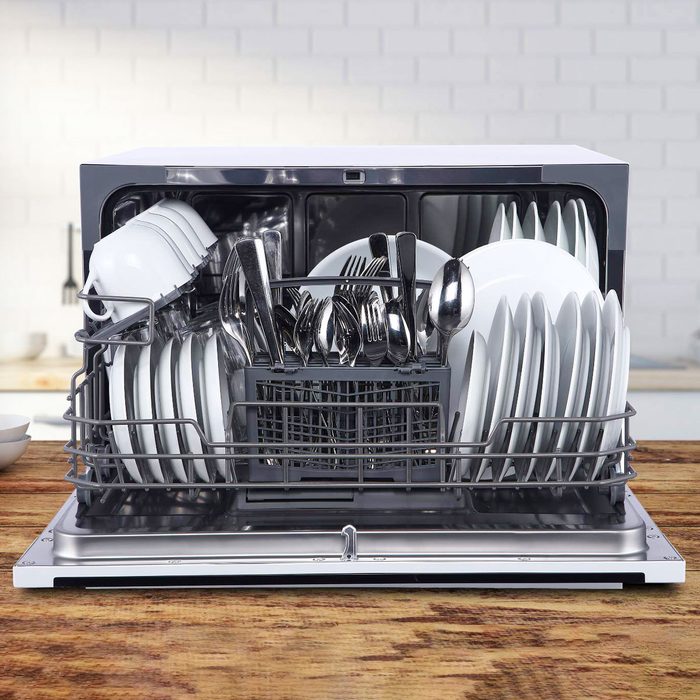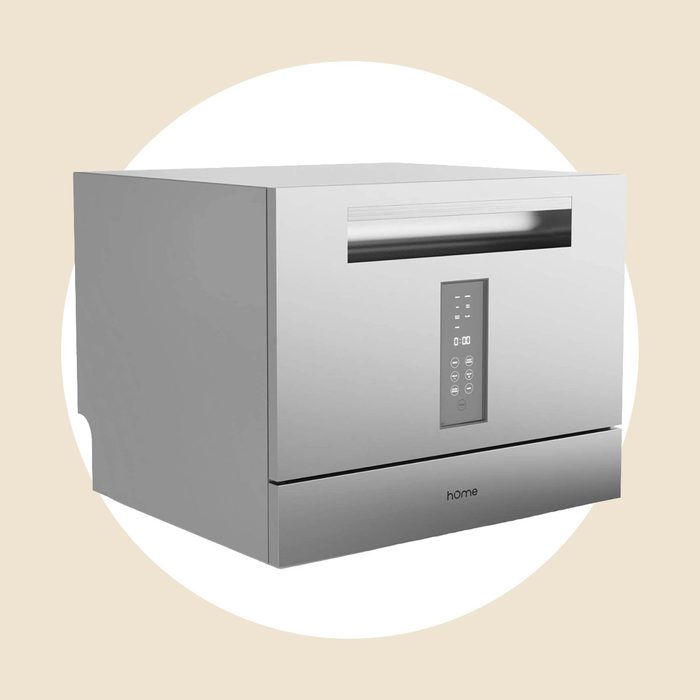 via merchant
via merchant
Best Overall Countertop Dishwasher
hOmeLabs Digital Countertop Dishwasher
hOmeLabs is taking home first prize with its stainless-steel digital countertop dishwasher. At $350, it’s one of the more affordable options on this list but you’d never know it based on its stellar performance. Just ask the 2,000-plus five-star ratings on Amazon!
The appliance holds up to six place settings, including 10-inch dinner plates, and comes with a cutlery basket. Connect the Energy Star-certified machine to your sink faucet, then choose from seven wash cycles on the touchscreen: heavy, normal, eco, high temp, quick wash, glass and rinse. Many of these cycles include drying, and there’s also a delayed start option for up to 24 hours. Plus, it works with water pressure as low as 6 PSI, so it’s suitable for use in RVs or campers.
The countertop dishwasher is a bit bulkier than others, but it’s also quieter. It operates at just 50 decibels. Most users say that they can barely hear it running (though it can be a little noisy when it drains at the end of the cycle), making it an ideal choice for any small living area.
Pros
- Seven wash cycles, with drying function
- Affordable
- Attractive exterior and spacious interior
- Energy Star certified
- Works with low water pressure
Cons
- Bulky design
 via merchant
via merchant
Best Splurge Countertop Dishwasher
Airmsen Portable Countertop Dishwasher
There’s so much to love about the Airmsen Portable Countertop Dishwasher that the higher price tag ($460) just makes sense. It has the same see-through window and built-in water tank that the other ultra-compact models have, but it’s able to hold up to four place settings, compared to the standard two. It also comes with a cutlery basket and a fruit basket and can perform five washing programs: normal, speed, glass, baby care and fruit. (The speed cycle takes only 29 minutes!)
An extra nifty feature is its automatic 72-hour ventilation after the wash cycle is complete, so even if you’re a little lazy with the unloading, you can be sure the appliance and its contents stay dry and odor-free. You may use any type of detergent, including pods, liquid or powder with this machine.
Either fill the water tank or hook it up to your sink and say hello to clean dishes! More than 1,000 happy customers already have.
Pros
- Ability to hold four place settings
- Water tank or faucet hookup
- Automatic 72-hour ventilation
- Compact and sleek-looking
- Comes with multiple accessories
Cons
- Expensive
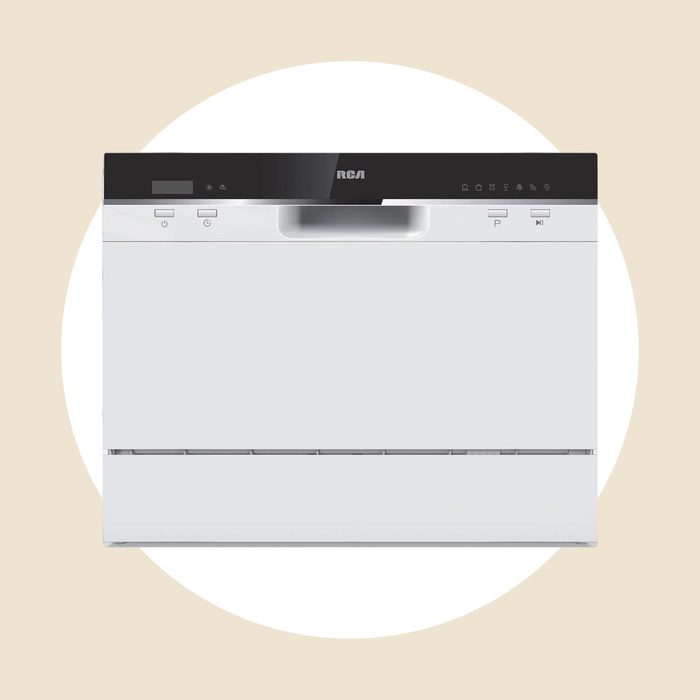 via merchant
via merchant
Best Budget Countertop Dishwasher
RCA Portable Countertop Dishwasher
Most countertop dishwashers cost between $300 and $500, but the RCA Portable Countertop Dishwasher is a great value, retailing for less than $210. It holds up to six place settings at a time and has both heavy and normal wash cycles, depending on your needs. Within the machine, there is an automatic detergent and rinse-agent dispenser. However, note that there is no heated drying option.
What’s nice about this dishwasher—besides its low price—is that it uses less than four gallons of water for a normal wash cycle, which helps conserve water and keep bills low. However, given that it’s a budget model, there are some design flaws that can make it less convenient to use. Some reviewers note that it doesn’t always drain fully after the cycle and large dinner plates don’t fit properly within the appliance.
Make sure you pick up a clean/dirty dishwasher magnet to keep track of each load.
Pros
- Good value
- Low water consumption
- Quiet during operation
- Holds six place settings
Cons
- Doesn’t always drain properly
- Larger plates might not fit
- No heated drying function
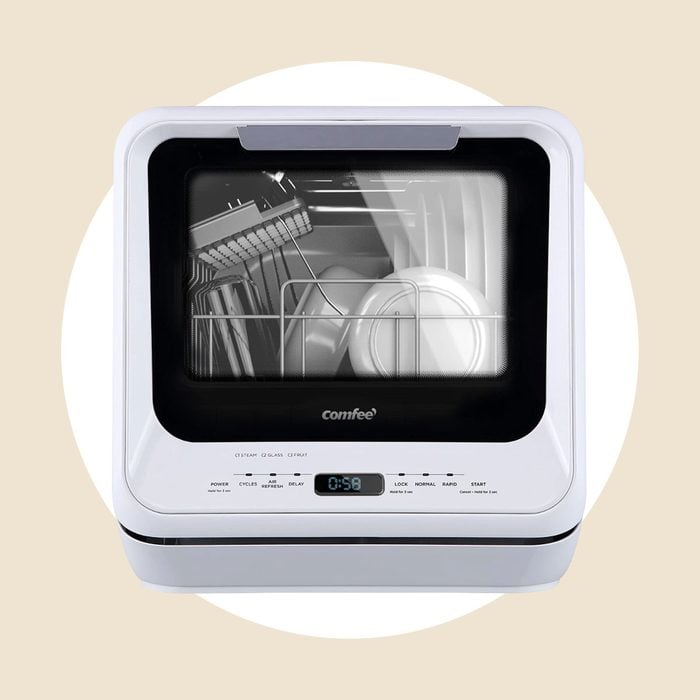 via merchant
via merchant
Best Compact Countertop Dishwasher
Comfee’ Countertop Dishwasher
Countertop dishwashers are always compact—that’s half their appeal! But few are quite as compact as the Comfee’ Countertop Dishwasher, a roughly 17-inch cube. The small-scale appliance fits easily underneath cabinets, and you can even tuck it away when it’s not running one of its six cycles: normal, rapid, steam, fruit, glass and air refresh. (The last of which is an extra drying mode to keep dishes dry and the machine fresh.)
The portable dishwasher has a built-in 5-liter water tank so that it doesn’t need to be hooked up to a faucet during operation (though it will need to drain into a sink once the wash cycle is complete). The water is heated to up to 250 degrees for thorough sterilization. The unit has a see-through window and holds two place settings at a time—perfect for one- or two-person households. Despite its reduced size, it’s still large enough to hold 10-inch dinner plates.
Pros
- Very compact
- Built-in water tank
- See-through window
- Six cycles, including steam and air refresh
Cons
- Small capacity
- Faucet adapter sold separately
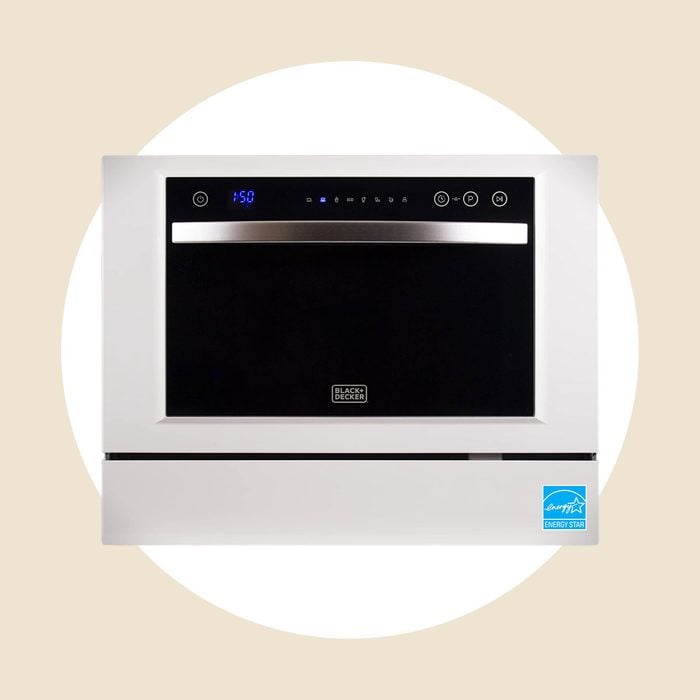 via merchant
via merchant
Best Spacious Countertop Dishwasher
Black+Decker Countertop Dishwasher
The Black+Decker Countertop Dishwasher is a worthwhile splurge, especially because you’re receiving a slightly larger footprint. Some might view the size as a pitfall, but we choose to see its spaciousness as an opportunity to clean more dishes at once. This dishwasher can accommodate up to six place settings at a time, and the interior has enough room for 10-inch dinner plates. The LED display lets you know how long is left in the cycle, and it’s even mounted on locking caster wheels, making it easier to move around your counter as needed.
The machine has an attractive stainless-steel exterior that’s more modern than that of many other models, and it’s Energy Star certified, meaning it could help save money on energy bills. The dishwasher has seven wash settings, including normal, intensive, eco, glass, 90-minute, rapid and soak, and it also features an optional heated dry setting. By the way, these are our favorite dishwashing gadgets.
Pros
- Fits 10-inch plates and six place settings
- Sleek design
- Energy Star certified
- Seven wash settings, including a dry setting
- Mounted on wheels
Cons
- Heavy and large
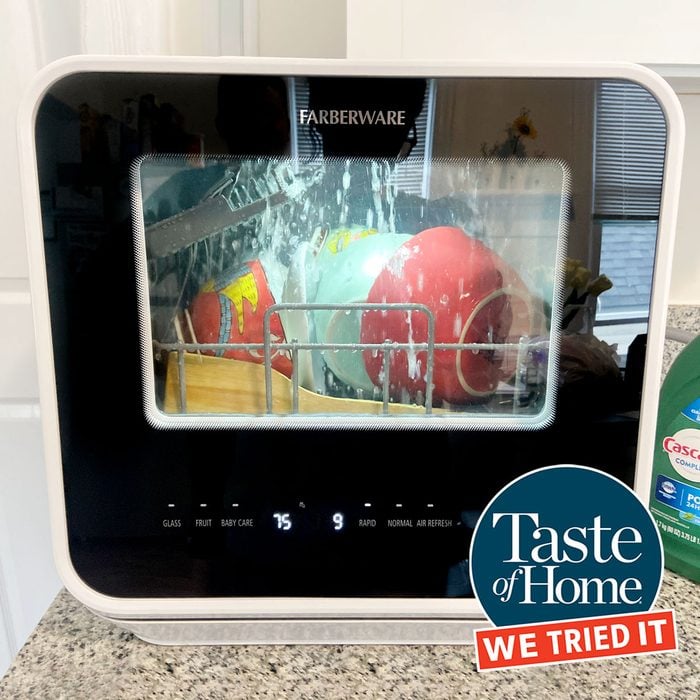 Annamarie Higley/Taste Of Home
Annamarie Higley/Taste Of Home
Best Easy-Installation Countertop Dishwasher
Farberware Complete Portable Countertop Dishwasher
Don’t want to go through the hassle of hooking up a dishwasher to your sink for every cycle? Then the Farberware countertop dishwasher is the unit for you. It doesn’t require any hookups for operation, thanks to its built-in 5-liter water tank. All you have to do is pour water into the tank, then it’s ready to go! However, it does come with a faucet hookup if you’d prefer that route.
I’ve been using this appliance regularly for more than a month and can vouch for it. I’d been without a dishwasher for three years, so I was desperate for a dishwasher sidekick. I can confidently say this machine has cut the time it takes me to do the chore in half. Time-saving aside, it’s incredibly water-saving, too, so I feel great about using it. It’s a little cumbersome to add the water to the tank with the provided pitcher, but it’s well worth it to not have to futz with a water line.
The Farberware countertop dishwasher is smaller than most and fits two or three place settings at a time, which works well for my two-person household. It has five wash programs, including options for sanitizing baby bottles and even washing fruit. (Discover more unusual items you can wash in your dishwasher.) I recommend the lengthier “normal” setting for its drying feature.
Pros
- No hookups needed
- Comes with accessories such as water pitcher, water line and baby bottle holder
- Easy touchscreen with five wash programs
- Drying capabilities
- See-through window
- Compact
Cons
- Small capacity
- Not compatible with rinse aids
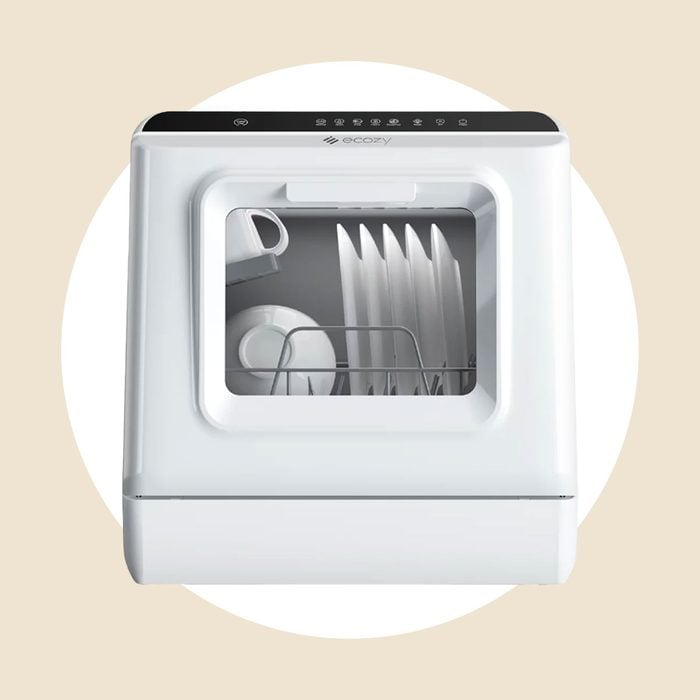 via merchant
via merchant
Best Quiet Countertop Dishwasher
Ecozy Countertop Dishwasher
Between the ceiling fan whirring, the washing machine thumping and the Roomba vacuum running, you have enough noise in your household. To avoid adding to the chaos too much, try the Ecozy Countertop Dishwasher, which runs at just 48 decibels. The quiet machine can perform five washing modes to match the level of your dishes’ dirtiness. The extra dry mode blasts dishes with hot air for 60 minutes, then ventilates for 72 hours.
This model boasts a convenient water tank, as well as a water hose for faucet hookup. In the box, you’ll find a dish rack, water pitcher, water hose, drain tube and more. The space-saving unit, which is 17x17x18 inches, is sure to make your suppertime routine so much simpler, whether you live in an RV, dorm, apartment, small house or boat.
Pros
- Very quiet at 48 decibels
- Water tank and faucet hookup
- Automatic 72-hour ventilation
- Compact
Cons
- Small capacity
What to Look for When Buying Countertop Dishwashers
We consulted Josh Mitchell, a plumbing technician and the founder of Plumbing Lab, about what he’d pay attention to when shopping for a countertop dishwasher. “The primary aspects I always advise considering are kitchen space, dishwasher capacity, energy efficiency and the types of cycles offered,” he explains. “From my experience, a suitable countertop dishwasher shouldn’t just fit your kitchen space; it should also meet your regular dishwashing demands without skyrocketing utility bills. Look for energy-efficient models that offer different wash cycles to handle various dishware and food residue.”
- Size: As their name suggests, countertop dishwashers are designed to be placed on the kitchen counter, so it’s important to measure your space and select an appliance that will fit. Fortunately, you should be able to find one among the wealth of options online. “Countertop dishwashers are a perfect match for individuals with space constraints, like those living in apartments or renting,” Josh says. “They are also ideal for small families, single individuals or couples who don’t accumulate many dishes.”
- Capacity: Depending on how many people live in your household, you might want to look for a countertop dishwasher with a larger capacity, which will allow you to clean more dishes at once. Capacity is typically indicated by the number of place settings. (One place setting includes a plate or bowl, glass, and silverware for one person.)
- Settings: Most portable dishwashers have multiple wash cycles to choose from, including rapid cycles, eco-friendly modes and even sanitation options for items like baby bottles. “Some come with advanced settings. Others are basic, focusing on standard wash and rinse cycles,” Josh says. “Your choice depends on what you prioritize most: advanced functions or simplicity and ease of use.”
- Water source: As mentioned previously, most countertop dishwashers hook up directly to your kitchen faucet during operation. However, there are some portable models with built-in water tanks, which allow them to be placed further away from a faucet.
- Maintenance: Don’t forget to consider the maintenance requirements of each countertop dishwasher. You may need to clean your dishwasher or change filters on a regular basis. Otherwise, you may end up with nasty smells or mold in your dishwasher. “Based on countless repairs and maintenance work I’ve conducted, I cannot stress enough the importance of regular upkeep,” Josh says. “To ensure longevity and efficiency, clean the filter frequently and ensure proper loading of dishes to avoid re-washing. Periodically run a cycle with a cup of white vinegar—with the machine empty—to clean out the interior and prevent odors.”
Why You Should Trust Us
Annamarie Higley, Taste of Home shopping editor, has been researching and testing small appliances, kitchen gear and consumables for more than two years. Some of her prior endeavors include reviewing the Ninja Creami and the GE Opal Ice Maker. When evaluating products on the market to test and/or recommend, Annamarie has the hands-on experience to guide her selections, which she bases on price, popularity, novelty, appearance and functionality.
How We Found the Best Countertop Dishwashers
We found the best countertop dishwashers by conducting our own market research, scouring online vendors’ selections, reading reviews, consulting experts in the camping and plumbing spaces, and firsthand testing. Some of those models we identified as our favorites were then also recommended by industry pros. Plus, we tested the most sought-after countertop dishwasher (based on Google searches) in our own kitchen to ensure its performance matched up with its popularity. We kept different consumers’ needs in mind and curated a list of appliances that fulfill various criteria, including affordability, portability, efficiency and more.
FAQ
Are countertop dishwashers efficient?
Countertop dishwashers are incredibly efficient. They often are able to run on less water pressure and with less water than traditional dishwashers. Countertop dishwashers typically only use a few liters or gallons of water, depending on their capacity, which is also less water than hand-washing requires. Pay attention to those models with Energy Star certification, which means they’re proven to be energy efficient by the U.S. Environmental Protection Agency and the U.S. Department of Energy.
Do countertop dishwashers need water line?
Some countertop dishwashers, such as the hOmeLabs model, require a water line, whereas others, such as the Farberware and Comfee’ models, do not. These dishwashers instead rely on a built-in water tank, typically around 5 liters, as their source of water throughout the wash cycle. Keep in mind that these dishwashers still need a place to drain, such as a bucket or a sink.
Do countertop dishwashers dry dishes?
Most countertop dishwashers do dry dishes in some capacity. Some models have a separate dry cycle, whereas others incorporate drying into preset wash cycles. The only dishwasher on this list that does not have drying capabilities is the RCA model. If this feature is important to you, be sure to read the fine print on the vendor’s website before purchasing.
Additional research was contributed by Camryn Rabideau.

